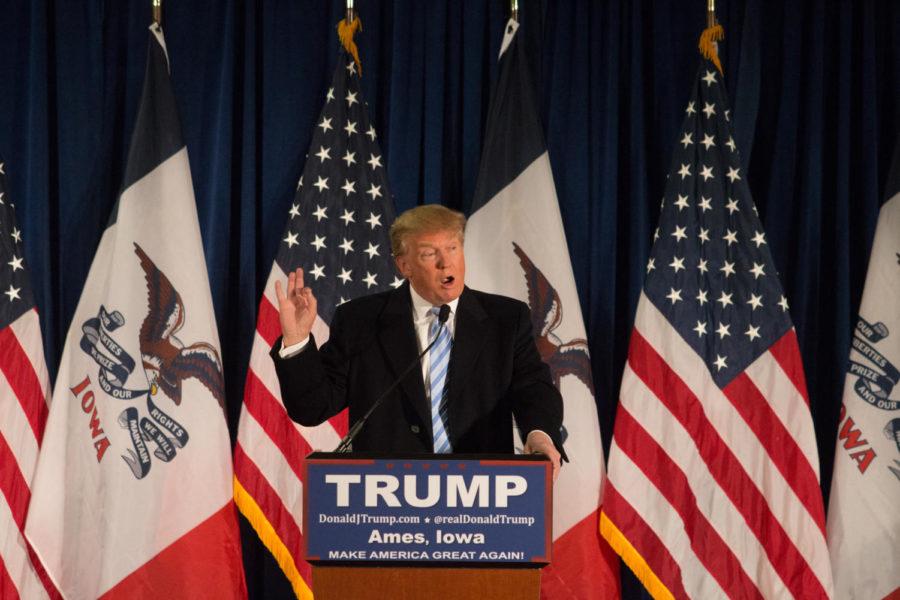Holst: How the media should cover Trump, part two
Presidential candidate and current Republican front-runner Donald Trump speaks to supporters during his rally at the Hansen Agriculture Learning Center Jan. 19, 2016.
January 15, 2018
Continued from “How the media should cover Trump, part one” in which is noted a majority of Americans disapprove of the media’s coverage of Trump.
The first failure discussed is how the media tends to focus far too much on things Trump does that might be stupid, petulant or mean, but are largely inconsequential.
The second failure of the media is when they make Trump out to seem crazy, but normalize people who actually advocate for insane policies using mild language.
A perception exists that Trump is an unusually extreme politician, both in terms of personality and policy. The former may certainly be true, but in terms of policy, Trump is hardly more conservative than the rest of the Republican Party.
In terms of taxes, Trump is right in line with the Republican Party. This is evidenced by the passage of the recent tax bill, which was supported by an overwhelming majority of GOP representatives.
In fact, every single Republican in the Senate has voted with Trump at least 82 percent of the time. This includes so-called “moderates” such as Susan Collins and “never Trumpers” like Jeff Flake. Yet this idea persists that a President Marco Rubio, for example, would somehow be extremely different.
Would a President Marco Rubio tweet crazy things at three in the morning? Probably not. But would he be pushing the exact same ideological agenda? His record of voting with Trump 96.4 percent of the time suggests he would.
Yet somehow, Rubio was perceived as a “moderate Republican” in the media and amongst Republican voters during the 2016 campaign. The media ought to do a better job of dismantling the notion that Republicans like Jeff Flake or Marco Rubio are any less extreme than Donald Trump.
It is the job of the media, at least in part, to maintain an informed electorate. As long as this dramatic misconception that Trump is somehow more extreme than other Republicans exists, the media has failed in that duty. In terms of policy, which is what really matters, Trump is a standard Republican.
Finally, the obsession many outlets have about the Russia investigation turns off millions of Americans who want to hear about the issues that directly impact them.
Now, the Russia scandal has many complex pieces to it and it is incredibly difficult to fully comprehend. Quite frankly, I don’t understand it. The main allegation seems to be that the Russian government hacked the DNC and leaked damaging emails through Wikileaks and that the Russians spread anti-Clinton propaganda on social media.
What the Mueller investigation is attempting to uncover is whether or not Trump or his campaign colluded with the Russians in this effort. So far, that has not been proven.
This has not stopped the media from covering the investigation intensively for months, while only 38 percent of Americans view the Trump/Russia story as a “very serious problem.” Further, in July, polling showed that only 6 percent of Americans viewed Russia as the most important issue facing Americans today.
In their haste to cover every possible break in the investigation, the media has gotten a number of stories wrong. This is the worst thing the media can do. When the media gets these stories wrong, they lend legitimacy to Trump’s claims that they are “fake news.” Worse still, it means Americans are less inclined to believe the media when they report the very real concerns with Trump’s tax plan or health care plans.
Could the Russia story potentially be a huge story? Sure, it could. If Mueller is able to prove some significant form of collusion between Trump and Russia, then the media should cover it. But when they continue to put out stories that turn out to have significant holes in them, they give the president and his administration more room to criticize them, which weakens an institution we need to be strong.
The media has failed in covering Trump. They failed during the campaign, and they’re failing now. President Trump is full of things to criticize, yet the media seems to consistently find the wrong areas to scrutinize. The media’s job is to inform the American people, and they can not do that if Americans do not trust them.
If the media starts to cover Trump’s flawed policy, not just his flawed personality, they may regain the trust they’ve lost in the American people.







